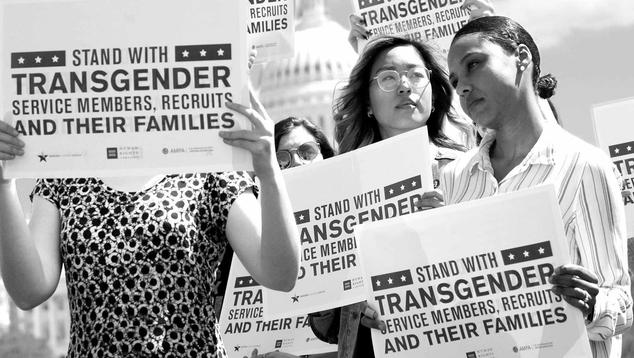Story Highlights
- Among key subgroups, only Republicans oppose transgender servicemembers
- Americans remain mixed on gender-related restroom polices
This article is the third in a monthlong series on Americans' views about LGBT issues. Gallup will release new findings every Thursday in June. Gallup's trends, including some extending back four decades, can be found here.
WASHINGTON, D.C. -- As President Donald Trump's ban on most transgender military servicemembers continues to face legal challenges, 71% of Americans support allowing openly transgender men and women to serve in the military.
| Favor | Oppose | No opinion | |||||||||||||||||||||||||||||||||||||||||||||||||||||||||||||||||||||||||||||||||||||||||||||||||
|---|---|---|---|---|---|---|---|---|---|---|---|---|---|---|---|---|---|---|---|---|---|---|---|---|---|---|---|---|---|---|---|---|---|---|---|---|---|---|---|---|---|---|---|---|---|---|---|---|---|---|---|---|---|---|---|---|---|---|---|---|---|---|---|---|---|---|---|---|---|---|---|---|---|---|---|---|---|---|---|---|---|---|---|---|---|---|---|---|---|---|---|---|---|---|---|---|---|---|---|
| % | % | % | |||||||||||||||||||||||||||||||||||||||||||||||||||||||||||||||||||||||||||||||||||||||||||||||||
| National adults | 71 | 26 | 2 | ||||||||||||||||||||||||||||||||||||||||||||||||||||||||||||||||||||||||||||||||||||||||||||||||
| Republicans | 43 | 53 | 4 | ||||||||||||||||||||||||||||||||||||||||||||||||||||||||||||||||||||||||||||||||||||||||||||||||
| Independents | 78 | 20 | 2 | ||||||||||||||||||||||||||||||||||||||||||||||||||||||||||||||||||||||||||||||||||||||||||||||||
| Democrats | 88 | 11 | 1 | ||||||||||||||||||||||||||||||||||||||||||||||||||||||||||||||||||||||||||||||||||||||||||||||||
| Military veterans | 56 | 43 | 1 | ||||||||||||||||||||||||||||||||||||||||||||||||||||||||||||||||||||||||||||||||||||||||||||||||
| Nonveterans | 73 | 25 | 2 | ||||||||||||||||||||||||||||||||||||||||||||||||||||||||||||||||||||||||||||||||||||||||||||||||
| Men | 64 | 34 | 2 | ||||||||||||||||||||||||||||||||||||||||||||||||||||||||||||||||||||||||||||||||||||||||||||||||
| Women | 79 | 20 | 2 | ||||||||||||||||||||||||||||||||||||||||||||||||||||||||||||||||||||||||||||||||||||||||||||||||
| 18-29 | 84 | 15 | 2 | ||||||||||||||||||||||||||||||||||||||||||||||||||||||||||||||||||||||||||||||||||||||||||||||||
| 30-49 | 73 | 25 | 2 | ||||||||||||||||||||||||||||||||||||||||||||||||||||||||||||||||||||||||||||||||||||||||||||||||
| 50-64 | 66 | 32 | 2 | ||||||||||||||||||||||||||||||||||||||||||||||||||||||||||||||||||||||||||||||||||||||||||||||||
| 65+ | 66 | 33 | 1 | ||||||||||||||||||||||||||||||||||||||||||||||||||||||||||||||||||||||||||||||||||||||||||||||||
| May 15-30, 2019 | |||||||||||||||||||||||||||||||||||||||||||||||||||||||||||||||||||||||||||||||||||||||||||||||||||
| Gallup | |||||||||||||||||||||||||||||||||||||||||||||||||||||||||||||||||||||||||||||||||||||||||||||||||||
These data are from a May 15-30 Gallup poll, which was conducted prior to a recent U.S. Circuit Court of Appeals decision that allows the ban to stand for the time being, but calls for a review of the policy that could still jeopardize its legal standing. On Tuesday, the House of Representatives voted to block funding to implement the policy -- though the measure's chances of passing in the GOP-controlled Senate, much like the recently passed Equality Act, are unlikely.
Majorities of Americans across nearly all key demographic groups, except for Republicans, support allowing transgender men and women to serve in the U.S. military. Republicans (43%) are far less likely than Democrats (88%) and independents (78%) to support allowing trans servicemembers.
A small majority of adults with military experience (56%) say that transgender people should be allowed to serve, though nonveterans are more likely to say this (73%).
Women are more likely than men to support transgender military service, and support is higher among younger adults than older Americans.
These findings about Americans' views of transgender people serving in the military are similar to Gallup's polling in the years leading up to the 2010 repeal of the military's Don't Ask Don't Tell policy, which barred gays and lesbians from serving openly. At the time, Gallup found that most Americans supported allowing openly gay servicemembers.
Americans Remain Split on Transgender Bathroom Policies
Americans' views on gender-related policies governing public restrooms have shown little movement in recent years. Gallup first polled on the issue in 2016, when Barack Obama's Department of Education directed public schools to allow transgender students to use restrooms and locker rooms that correspond with their gender identity, rather than their birth gender. This policy has since been rescinded under the Trump administration.
The issue has roiled local and state politics, but public opinion has changed little, with 51% of Americans saying that transgender people should have to use the restroom corresponding with their birth gender and 44% saying that transgender people should use the restroom that corresponds with their gender identity.
| Birth gender | Gender identity | No opinion | |||||||||||||||||||||||||||||||||||||||||||||||||||||||||||||||||||||||||||||||||||||||||||||||||
|---|---|---|---|---|---|---|---|---|---|---|---|---|---|---|---|---|---|---|---|---|---|---|---|---|---|---|---|---|---|---|---|---|---|---|---|---|---|---|---|---|---|---|---|---|---|---|---|---|---|---|---|---|---|---|---|---|---|---|---|---|---|---|---|---|---|---|---|---|---|---|---|---|---|---|---|---|---|---|---|---|---|---|---|---|---|---|---|---|---|---|---|---|---|---|---|---|---|---|---|
| % | % | % | |||||||||||||||||||||||||||||||||||||||||||||||||||||||||||||||||||||||||||||||||||||||||||||||||
| May 15-30, 2019 | 51 | 44 | 5 | ||||||||||||||||||||||||||||||||||||||||||||||||||||||||||||||||||||||||||||||||||||||||||||||||
| May 3-7, 2017 | 48 | 45 | 7 | ||||||||||||||||||||||||||||||||||||||||||||||||||||||||||||||||||||||||||||||||||||||||||||||||
| May 4-8, 2016 | 50 | 40 | 10 | ||||||||||||||||||||||||||||||||||||||||||||||||||||||||||||||||||||||||||||||||||||||||||||||||
| Gallup | |||||||||||||||||||||||||||||||||||||||||||||||||||||||||||||||||||||||||||||||||||||||||||||||||||
The percentage of Americans who now have no opinion (5%) is half of what it was in 2016, likely reflecting that they have become more familiar with the issue in recent years.
Having restroom assignment based on birth gender is preferred by most by Republicans (78%) and men (61%).
By contrast, Democrats (66%), adults aged 18 to 29 (61%) and women (53%) are the groups most likely to say students should be able to choose bathrooms based on their gender identity.
| Birth gender | Gender identity | ||||||||||||||||||||||||||||||||||||||||||||||||||||||||||||||||||||||||||||||||||||||||||||||||||
|---|---|---|---|---|---|---|---|---|---|---|---|---|---|---|---|---|---|---|---|---|---|---|---|---|---|---|---|---|---|---|---|---|---|---|---|---|---|---|---|---|---|---|---|---|---|---|---|---|---|---|---|---|---|---|---|---|---|---|---|---|---|---|---|---|---|---|---|---|---|---|---|---|---|---|---|---|---|---|---|---|---|---|---|---|---|---|---|---|---|---|---|---|---|---|---|---|---|---|---|
| % | % | ||||||||||||||||||||||||||||||||||||||||||||||||||||||||||||||||||||||||||||||||||||||||||||||||||
| National adults | 51 | 44 | |||||||||||||||||||||||||||||||||||||||||||||||||||||||||||||||||||||||||||||||||||||||||||||||||
| Republicans | 78 | 18 | |||||||||||||||||||||||||||||||||||||||||||||||||||||||||||||||||||||||||||||||||||||||||||||||||
| Independents | 50 | 46 | |||||||||||||||||||||||||||||||||||||||||||||||||||||||||||||||||||||||||||||||||||||||||||||||||
| Democrats | 27 | 66 | |||||||||||||||||||||||||||||||||||||||||||||||||||||||||||||||||||||||||||||||||||||||||||||||||
| Men | 61 | 35 | |||||||||||||||||||||||||||||||||||||||||||||||||||||||||||||||||||||||||||||||||||||||||||||||||
| Women | 42 | 53 | |||||||||||||||||||||||||||||||||||||||||||||||||||||||||||||||||||||||||||||||||||||||||||||||||
| 18-29 | 37 | 61 | |||||||||||||||||||||||||||||||||||||||||||||||||||||||||||||||||||||||||||||||||||||||||||||||||
| 30-49 | 58 | 38 | |||||||||||||||||||||||||||||||||||||||||||||||||||||||||||||||||||||||||||||||||||||||||||||||||
| 50-64 | 52 | 42 | |||||||||||||||||||||||||||||||||||||||||||||||||||||||||||||||||||||||||||||||||||||||||||||||||
| 65+ | 52 | 41 | |||||||||||||||||||||||||||||||||||||||||||||||||||||||||||||||||||||||||||||||||||||||||||||||||
| May 15-30, 2019 | |||||||||||||||||||||||||||||||||||||||||||||||||||||||||||||||||||||||||||||||||||||||||||||||||||
| Gallup | |||||||||||||||||||||||||||||||||||||||||||||||||||||||||||||||||||||||||||||||||||||||||||||||||||
Two in Three Americans Prefer Separate Restrooms for Men and Women
Many public places have responded to the transgender restroom policy debate by providing unisex restrooms that can be used by anyone. But according to the new poll, Americans prefer separate bathrooms for men and women (68%) in large public places as opposed to unisex ones (30%).
| Separate bathrooms | Unisex bathrooms | No opinion | |||||||||||||||||||||||||||||||||||||||||||||||||||||||||||||||||||||||||||||||||||||||||||||||||
|---|---|---|---|---|---|---|---|---|---|---|---|---|---|---|---|---|---|---|---|---|---|---|---|---|---|---|---|---|---|---|---|---|---|---|---|---|---|---|---|---|---|---|---|---|---|---|---|---|---|---|---|---|---|---|---|---|---|---|---|---|---|---|---|---|---|---|---|---|---|---|---|---|---|---|---|---|---|---|---|---|---|---|---|---|---|---|---|---|---|---|---|---|---|---|---|---|---|---|---|
| % | % | % | |||||||||||||||||||||||||||||||||||||||||||||||||||||||||||||||||||||||||||||||||||||||||||||||||
| May 15-30, 2019 | 68 | 30 | 2 | ||||||||||||||||||||||||||||||||||||||||||||||||||||||||||||||||||||||||||||||||||||||||||||||||
| May 15-30, 2019 | |||||||||||||||||||||||||||||||||||||||||||||||||||||||||||||||||||||||||||||||||||||||||||||||||||
| Gallup | |||||||||||||||||||||||||||||||||||||||||||||||||||||||||||||||||||||||||||||||||||||||||||||||||||
Majorities of all key subgroups favor separate restrooms for men and women, with Republicans (81%) most in favor, but also a little over half of 18- to 29-year-olds (52%) and Democrats (56%).
Bottom Line
With gay marriage now a political moot point and Don't Ask Don't Tell having been repealed for several years, LGBT activists have largely shifted their focus to trans issues as the Trump administration has moved to undo the trans-friendly policies of the Obama era.
Similar to their views on openly gay servicemembers in the aughts, most Americans support allowing transgender people to serve in the U.S. military. This contrasts with Trump's ban on transgender servicemembers, which he announced via a series of tweets in July 2017. Though the ban has since been subject to legal and political scrutiny, it remains in place.
Gender policies around public restrooms are much more mixed, with Americans leaning slightly toward policies based on one's birth gender rather than their gender identity. While public opinion has moved little in recent years, the actual federal policies for schools on this issue have undergone an about-face from the previous presidency. Views on the policies are strongest by political party identification, so it's very likely that policy changes will only take place upon shifts in party control at state and federal levels -- as was the case in North Carolina, which became the focal point of this issue years ago.




